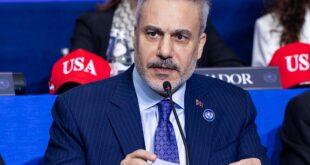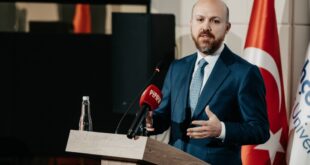Relations with Turkey have become a hot topic amid Greek election campaigning with both the governing and opposition parties sharpening their anti-Turkish rhetoric as election day draws near.
While supporting Turkey’s EU membership bid during his embattled premiership, New Democracy Party, or NDP, leader and Prime Minister Costas Karamanlis has shifted the focus of public opinion and found another “national threat” – Macedonia. He used the name dispute with the former Yugoslav country as a pivotal instrument in domestic and international politics, making Greek citizens more angered by Macedonia than Turkey. Furthermore, Karamanlis attended Turkish Prime Minister Recep Tayyip Erdoğan’s son’s wedding, and many observers labeled the symbolic presence “a new page in Turkish-Greek relations.”
But this course has changed during campaigning as Karamanlis’ liberal party turned its policies toward a more right-wing direction, aiming to secure votes from undecided Greeks.
“Turkey’s bid for the European Union is directly tied to Ankara’s attitude toward Greece. If Turkey continues its policy of aggressiveness, then there will be consequences for its candidacy,” Karamanlis said in a recent speech for the Oct. 4 elections in Serres, a province near the Bulgarian border.
Panayotis Psomiadis, governor of Greek Macedonia and one of the leading figures of the NDP, also said Greece must rethink its policy regarding Turkey. Also, Foreign Minister Dora Bakoyanni, who had a pro-peace stance toward Turkey during her career, has issued a stern warning to Turkey. “The ball is now in Turkey’s court,” she said.
PASOK’s position
The main opposition party, PASOK, has taken a similar stance against Turkey with party leader Giorgos Papandreou, who is widely tipped to become the new prime minister, using the same rhetoric as his main rival Karamanlis.
Despite his efforts to thaw relations with Turkey during his time at the Foreign Ministry in the 1990s, Papandreou said his government would block Turkey’s EU accession “if Ankara does not change its behavior toward Greece.”
“We are the most fanatic supporters of Turkey’s bid for the EU. But this does not mean we will accept the Turkish attitude in the Aegean Sea,” a senior official from PASOK has said.
Andreas Loverdos, a senior lawmaker who is in charge of the PASOK Foreign Affairs Bureau, accused Foreign Minister Dora Bakoyannis of what he called “a passive stance” toward Turkey. “The government has no plan for Turkish-Greek relations. We demand that Turkey abides to the demands of the EU and to recognize the Republic of Cyprus,” he said, referring to Greek Cyprus, which is already holding reunification talks with Turkish Cyprus.
Loverdos’ tone, however, worries the “pacifists” in PASOK who do not want to predict further consequences if Papandreou were to appoint him as foreign minister in his future government.
The politician showing the strongest anti-Turkey approach among PASOK’s ranks is the former foreign minister, Theodoros Pagkalos. The ex-minister sparked a heated debate when he alleged that he has a “confidential book” of the Turkish military that he said includes course action in case of a possible invasion of a Greek island. But Pagkalos’ claims have fizzled since the PASOK leadership did not welcome his extreme views.
Different picture
While the ruling and opposition parties were using Turkey as leverage in the election campaigns, the ultra-right and leftists drew a far different picture for Greek-Turkish relations.
Ultra-nationalist LAOS used “Say no to Macedonia and Turkey” as one of its main electoral slogans and its well-known leader, Giorgos Karatzaferis, tried to formulate a collective emotion of hatred against everyone who does not support LAOS policies. “If I become prime minister, I will stop all this foolishness of a one-sided, friendly approach toward Turkey,” Karatzaferis said in a recent interview.
In the meantime, the leftists, who believe that Turkey and Greece have many things in common, said the two nations should not allow foreign imperialistic powers such as the United States to harm Greek-Turkish relations for their increasing profits by selling weapons to two countries.
Christos Poulakis, a journalist and member of leftist Synaspismos party, said: “The differences between Greece and Turkey are totally generated by Washington. The people of the two countries have nothing to divide them.”
 Eurasia Press & News
Eurasia Press & News



